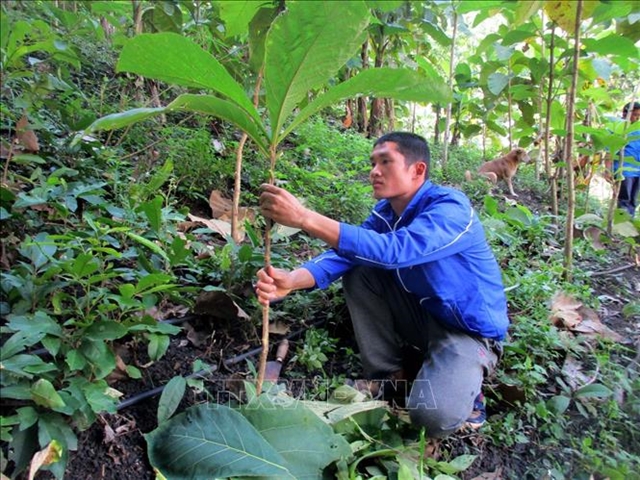 Society
Society


|
| Hà Văn Tình, a Thai ethnic minority man living in Chiền Cống Village, Mường Lát Township, is a pioneer in the local afforestation movement to prevent natural disasters. — VNA/VNS Photo |
THANH HÓA — Young people from the border district of Mường Lát in Thanh Hóa Province have been planting protective forests to limit the increasing risk of landslides.
The project has both brought economic benefits to growers and contributed to increasing forest coverage on barren hills.
The volunteers have so far planted 200ha of forest, and many households have benefited with incomes of VNĐ80 million (US$3,400) -VNĐ200 million ($8,620) per year.
Hà Văn Điệp, a Thai ethnic minority man living in Lát Village, Tam Chung Commune, was born into a poor family. After leaving high school, he had to work as a labourer just to get by.
In 2016, the Mường Lát District Youth Union told him about an economic development plan for the forest, and he decided to sign up.
He started off by borrowing VNĐ40 million from the Social Policy Bank in Mường Lát District and from friends to import different varieties of plants and trees. He also turned unused land into a forest for breeding pigs, chickens and cows which earns him tens of millions of đồng per year.
He said he realised that if the trees kept falling, the forest would disappear - and that natural disasters, like floods and drought, could become worse.
“Floods, especially flash floods, happen frequently in this area,” he said. “Afforestation on the bare hills is contributing to regulating water sources and limiting soil erosion and flash floods.”
His work is carefully planned. He plants different trees in layers so the high trees create shade for the fruit trees.
His forest is growing day by day with a current area of about 8 hectares. He now has five cows, 20 pigs, 15 goats and numerous chickens.
His family's income has reached VNĐ200 million/ per year.
Besides his business, Điệp is also an active member of the local Youth Union. Together with local youths, he lends a hand to help families upgrade their houses before storms hit the region.
He also shows young people how to start their own businesses and alleviate poverty.
Hà Văn Tình, another Thai ethnic minority man living in Chiền Cống Village, Mường Lát Township, was also a pioneer in the local afforestation movement.
Born into a poor family living on the banks of the Mã River, Tình spent his childhood in poor conditions and constantly hungry.
In 2018, realising that afforestation contributed to mitigating climate change and combating flash floods and landslides, Tình decided to plant large trees for economic development and natural disaster prevention.
He spent the money he borrowed from Mường Lát District’s Social Policy Bank to buy seeds and seedlings of trees such as xoan and lát.
His plan to cultivate large trees combined with breeding cows and pigs has been developing day by day, bringing him a high and stable income of VNĐ170 million per year.
He also teaches young people about science and protecting the forests.
During the COVID-19 pandemic, he has encouraged people living in border areas to wear masks, wash their hands and disinfect their homes to prevent the spread of the pandemic.
Secretary of the district's Youth Union Lâu Văn Phía said since 2017, Thanh Hóa's Department of Agriculture and Rural Development had been donating seedlings and organising technical training courses.
The local Youth Union plans to continue its support for its members and young people to develop economic afforestation, especially among the H'Mông and Khơ Mú ethnic groups. —VNS




